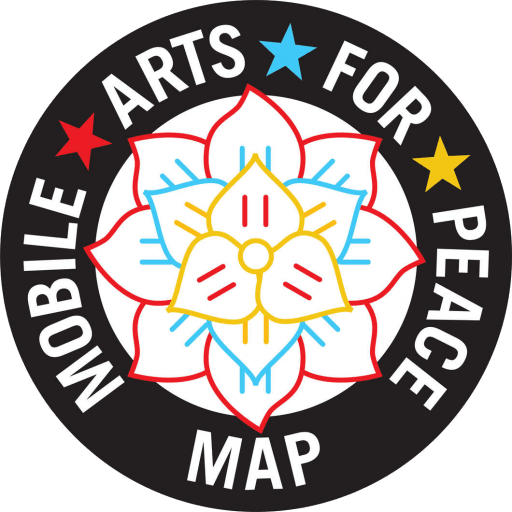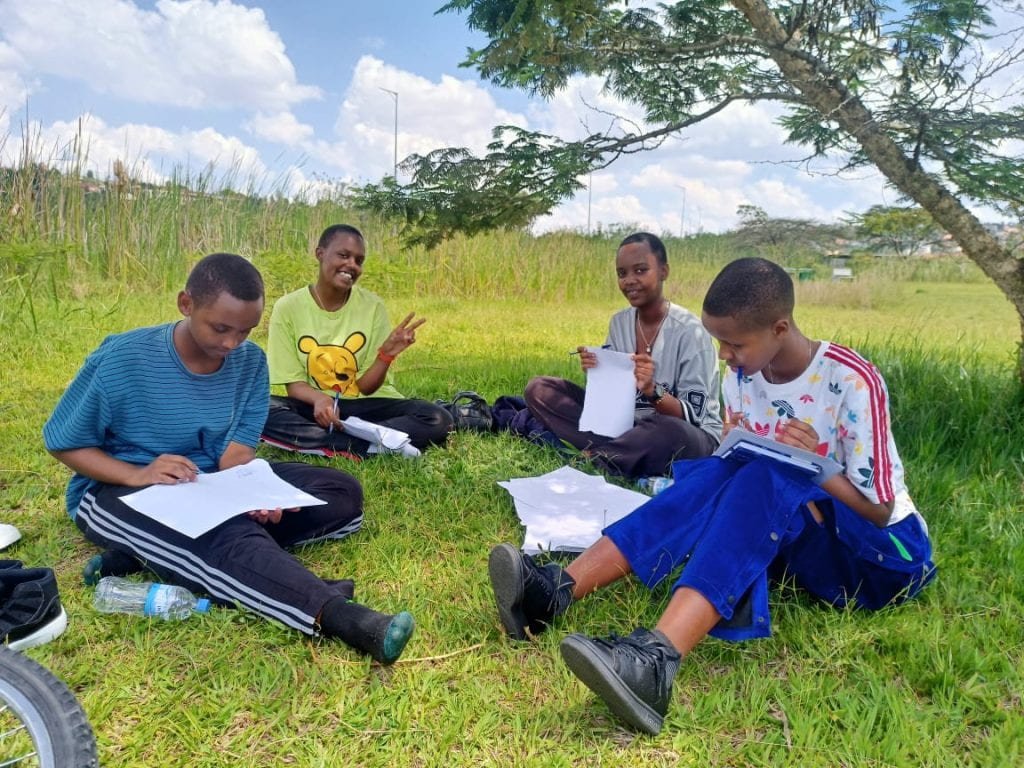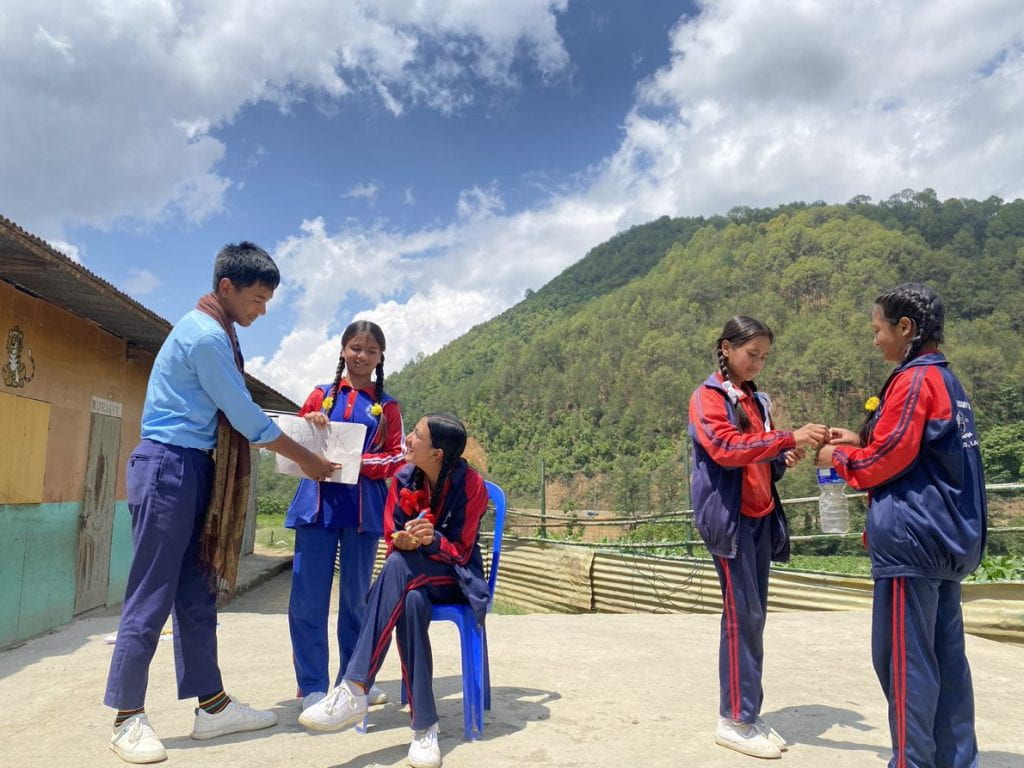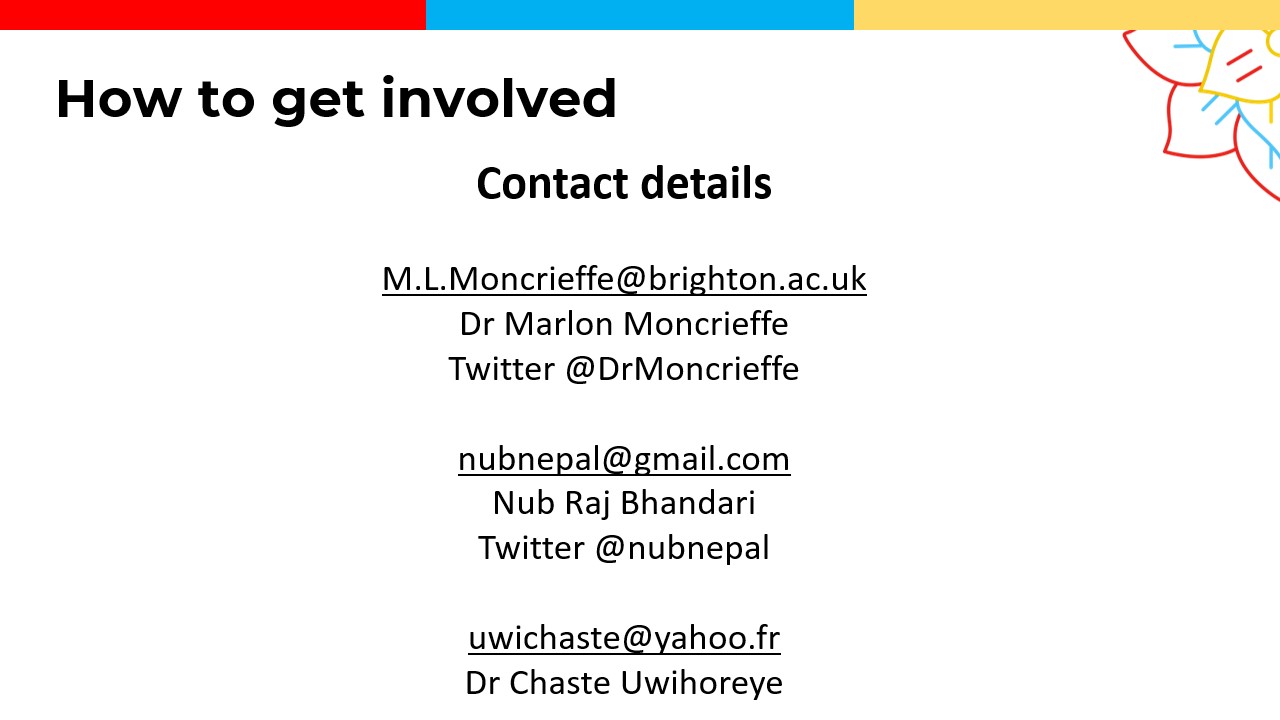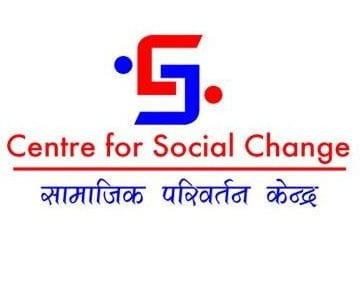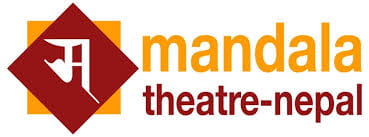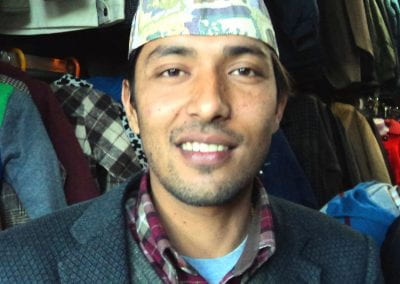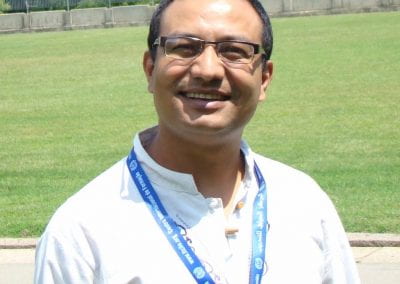Current projects
Advocating for progressive peacebuilding curricula through bicycling and human-centred ‘policy in action’ workshops
Our two projects in Nepal are ‘Picturing the Past, Present & Future’ led by Dr Marlon Lee Moncrieff (PI) from the University of Brighton, and ‘Inter-generational Dialogue’ led by Mr Sakar Pudasaini (PI) the Founder of Karkhana Samuha. They are both concerned with everyday peacebuilding processes that seek to address curriculum development through unconventional means.
Picturing the Past, Present & Future…
Enhancing dialogue between young people and policy through photographic documentation of bicycle journeys to improve the wellbeing of women and girls.
Inter-generational dialogue
Facilitating inter-generational dialogue through a co-created participatory arts-based community curriculum.
In the case of ‘Picturing the Past, Present & Future’, working alongside partner organisations, such as the Janaki Woman Awareness Society in Nepal (and Uyisenga Ni Imanzi (UMN) in Rwanda), the project aims to fuse Physical Education and Art with advancing Civic Education policies in Nepal and Rwanda.
Young women from selected schools in Rwanda (and Nepal) will be guided to take their own bicycle journeys (as individuals, pairs or in a group), visiting spaces of curiosity in their localities and beyond.
Using cameras, they will capture images on their journeys, archiving these through photographic journals.
Curriculum policy makers will be invited to bicycle training and art workshops to observe the methodologies and research in action, and to share their reflections of the process helping to inform the direction of policy briefs.
In ‘Inter-generational Dialogue’, Karkhana Samuha’s human-centred design approach ‘Think Make Play Improve’ (TMPI) will explore co-creation processes with and for youth, creating a peacebuilding curriculum that makes visible their desires and concerns, using indigenous and contextualised forms of storytelling.
The project works in three locations in Nepal, and partners with Child Clubs, Youth Clubs, local government officials and/or institutions of higher education.
The methodology focuses on three “policy-in-action” co-creation workshops, which will engage key stakeholders to visit the programs, and see the curriculum in action.
These will be complimented by technical meetings and through public dissemination strategies.
Previous MAP work in Nepal
In Nepal, MAP aims to influence national curricula and youth policy through local level in-school and out-of-school clubs.
The MAP clubs will target the local level governance structures including the Municipality and Rural Municipality Child Pathways to Impact 3 Rights Committee and the Provincial Child Rights Committee, in addition to the National Youth Council and District Youth Council of the western and southern districts.
Child and youth club-led initiatives will identify and prioritize local issues alongside the promotion of intergenerational dialogue and child-to-child peer learning to share, motivate, and teach other children to develop similar practices in their respective schools and communities.
Local cultural forms such as Deuda (from the western part of the country) and Mithila Art (from the southern part of the country) alongside Lok Geet (folk songs specific to varied parts of the country) will be adapted for dialogic purposes. Deuda can be used as a cultural form to explore local issues due to its question-answer structure and inclusivity. Mithila Art has been used across generations by women and girls to explore local issues through visual arts, using locally-sourced materials to paint communal murals inside homes, entry ways and exterior walls.
Arts-based communication systems will be informed by Forum Theatre, Playback Theatre and street drama with partner organisation Mandala Theatre, alongside generating the capacity of children and youth as video makers.
MAP in Nepal has produced a Theory of Change which summarises the team’s approaches and aspirations for the project in Nepal. They have also produced a list of core partners working with MAP in Nepal, including cultural artists, schools and policymakers.
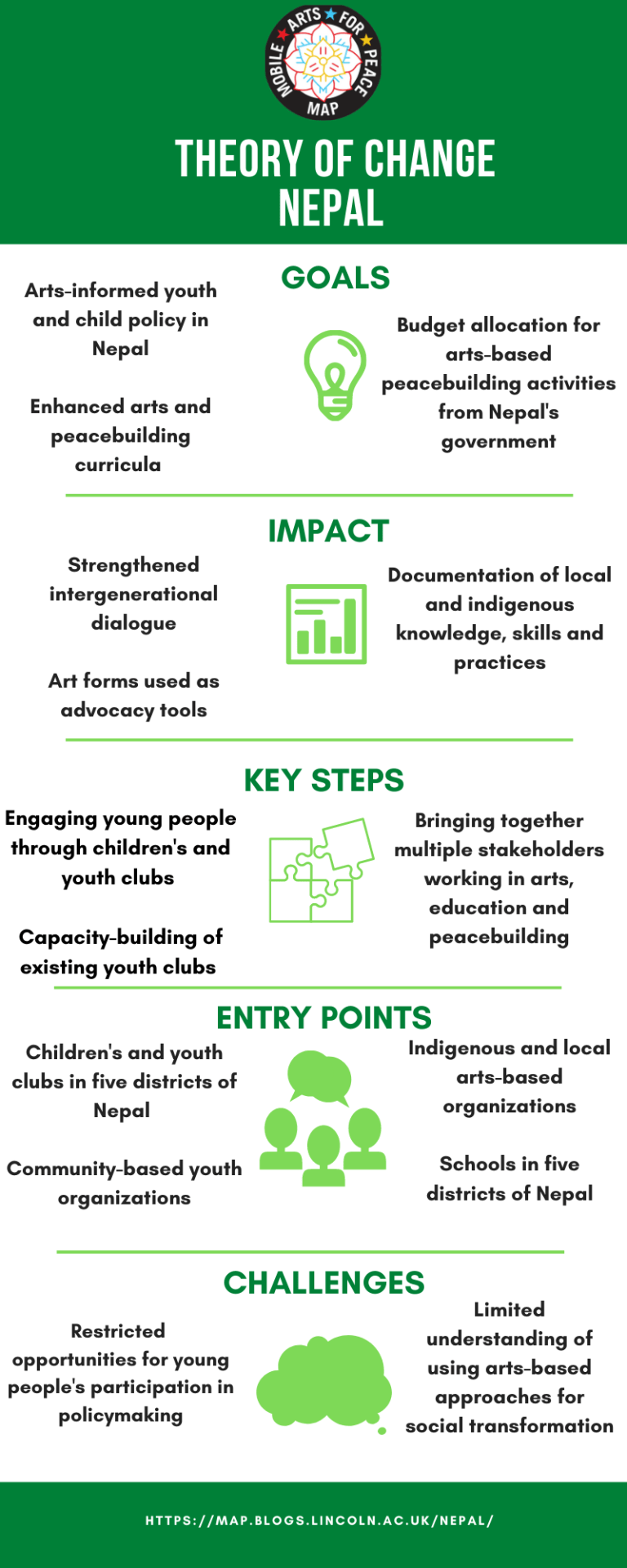
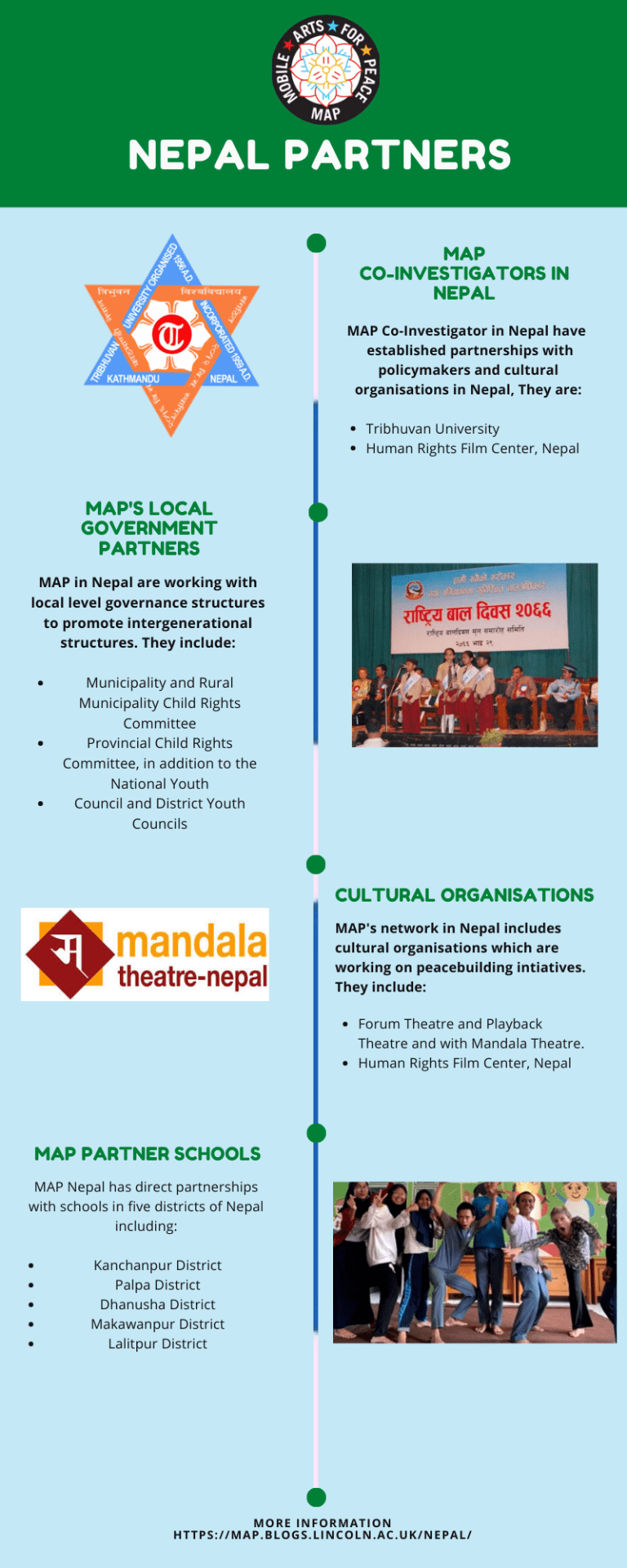
Our work in Nepal
Nepal is a small landlocked country sandwiched between China and Nepal. A small country covering 147181 sq. km., it has diverse landscape, which includes high Himalayas in the North to the lower plain in the South. It is also diverse in culture and demography. There are over 125 casts and ethnic groups and over 121 languages.
Nepal is one of the most beautiful countries with huge natural diversity, which attracts tourists from all around the world. Hence, tourism is the priority of the Nepali state for economic growth and development.
Having a history of over 250 years as a country, Nepal has passed through many political transitions. Nepal has transformed into a federal republic recently after being under a unitary monarchical system for more than two centuries. Nepal experienced a decade of armed conflict from 1996 – 2006. Currently the Truth and Reconciliation Commission and Disappeared Commission are collecting complaints and evidence for the purpose of hearings. Nepal recently introduced a new federal system of politics through its new 2015 constitution.
Being diverse in ethnicity and caste, Nepal has different forms of Art and Culture too. From the theater of ancient ages, dances, paintings and other forms of art, there is huge diversity in culture.
26m
Population
Languages Spoken
%
approx % of population under 19
Caste/Ethnic groups
Our work in Nepal
The MAP team first started working together in Nepal through the 2018-19 Changing The Story funded project “Examining Interpretations of Civil National Values made by Young People in Post-Conflict Settings (Kenya and Nepal)”.
This project aims to empower children in post-conflict settings to articulate their interpretations and shared communications of civic national values through their creation of a performance arts-based ‘scheme of work’ as a process of transformative learning for supporting local and global Civil Service Organisations (CSOs) in reducing poverty and advancing education for all, as part of the peace-building process.
The project has four central aims:
1. Explore how children in post-conflict settings interpret civic national values by their own conceptions, actions and reflections, supported in their application of varied performance arts-based tools and techniques for their shared communications.
2. Empower children in post-conflict settings to develop and advance their thinking about the past; the present and future possibilities of peacebuilding through theories of ‘reflection’.
3. Examine the perspectives of teachers on ‘civic national values’ including the varied ways they pass these narratives to their learners.
4. Facilitate our research partners to continuously analyse, reflect and reconceptualise their understandings and shared communications of civic national values for advancing future policymaking through a performance arts-based ‘scheme of work’ that can be applied locally, nationally and internationally in comparative contexts.
It is hoped that, through this project, children in post-conflict settings; their teachers; and CSOs become empowered by their reflections, conceptions and arts-based performances, benefitting their current and future processes of education, and advancing their shared communications of ‘civic national values’, allowing for continued peacebuilding.
Building on the partnerships developed through this project, the vision for MAP in the context of Nepal is for public education, empowerment and policy advocacy for peace education. MAP will educate and engage children and young people in peace education through different forms of arts. Children and young people will use different forms of art as a tool to create harmony and cohesion in the society. MAP will develop the capacity of youth and teachers to make them community agents of change to address peace and harmony.
